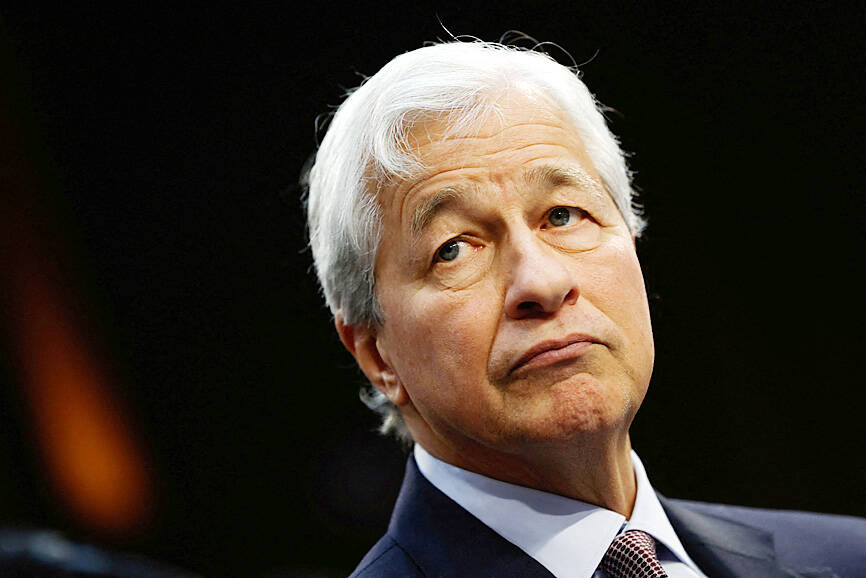JPMorgan Chase & Co CEO Jamie Dimon cautioned investors that the turmoil caused by US President Donald Trump’s tariffs and a global trade war could slow growth in the world’s largest economy, spur inflation and potentially lead to lasting negative consequences.
In his annual letter to shareholders, published yesterday following a rout last week that wiped off trillions of dollars from global stock markets, Dimon expressed concerns about how the tariffs would impact the US’ long-term economic alliances.
“The economy is facing considerable turbulence (including geopolitics), with the potential positives of tax reform and deregulation and the potential negatives of tariffs and ‘trade wars,’ ongoing sticky inflation, high fiscal deficits and still rather high asset prices and volatility,” Dimon wrote.

Photo: Reuters
Dimon, 69, has run the largest US bank for 19 years and is one of the most prominent voices in corporate US.
“We are likely to see inflationary outcomes ... Whether or not the menu of tariffs causes a recession remains in question, but it will slow down growth,” he wrote.
JPMorgan’s economists raised the risk of a US and global recession this year to 60 percent from 40 percent after Trump unveiled the steepest trade barriers in more than 100 years on Wednesday last week.
Meanwhile, Goldman Sachs Group Inc has raised the odds of a US recession to 45 percent from 35 percent, the second time it has increased its forecast in a week.
Dimon noted the potential for retaliation by other countries and said tariffs could affect economic confidence, investments, capital flows, corporate profits and the US dollar.
“The quicker this issue is resolved, the better, because some of the negative effects increase cumulatively over time and would be hard to reverse,” he wrote.
Tariffs also raise questions about the direction of interest rates, Dimon said.
While rates have declined recently, because of the weaker US dollar, the prospect of slower growth and declining risk appetite could cause rates to rise, he said, referring to the stagflation of the 1970s.
Expectations for modest US growth, known as a soft landing, could also be derailed.
“We enter this time of uncertainty with high equity and debt prices, even after the recent decline ... Markets still seem to be pricing assets with the assumption that we will continue to have a fairly soft landing. I am not so sure,” he wrote.
His comments come after billionaire fund manager Bill Ackman, who endorsed Trump’s run for president, said the US leader was losing the confidence of business leaders and should pause his trade war.
“The president has an opportunity to call a 90-day time out” to resolve trade issues via negotiation, Ackman wrote on X.
“If, on the other hand ... we launch economic nuclear war on every country in the world, business investment will grind to a halt, consumers will close their wallets and pocket books, and we will severely damage our reputation with the rest of the world that will take years and potentially decades to rehabilitate,” he added.

South Korea’s equity benchmark yesterday crossed a new milestone just a month after surpassing the once-unthinkable 5,000 mark as surging global memory demand powers the country’s biggest chipmakers. The KOSPI advanced as much as 2.6 percent to a record 6,123, with Samsung Electronics Co and SK Hynix Inc each gaining more than 2 percent. With the benchmark now up 45 percent this year, South Korea’s stock market capitalization has also moved past France’s, following last month’s overtaking of Germany’s. Long overlooked by foreign funds, despite being undervalued, South Korean stocks have now emerged as clear winners in the global market. The so-called “artificial intelligence

NEW IDENTITY: Known for its software, India has expanded into hardware, with its semiconductor industry growing from US$38bn in 2023 to US$45bn to US$50bn India on Saturday inaugurated its first semiconductor assembly and test facility, a milestone in the government’s push to reduce dependence on foreign chipmakers and stake a claim in a sector dominated by China. Indian Prime Minister Narendra Modi opened US firm Micron Technology Inc’s semiconductor assembly, test and packaging unit in his home state of Gujarat, hailing the “dawn of a new era” for India’s technology ambitions. “When young Indians look back in the future, they will see this decade as the turning point in our tech future,” Modi told the event, which was broadcast on his YouTube channel. The plant would convert

‘SEISMIC SHIFT’: The researcher forecast there would be about 1.1 billion mobile shipments this year, down from 1.26 billion the prior year and erasing years of gains The global smartphone market is expected to contract 12.9 percent this year due to the unprecedented memorychip shortage, marking “a crisis like no other,” researcher International Data Corp (IDC) said. The new forecast, a dramatic revision down from earlier estimates, gives the latest accounting of the ongoing memory crunch that is affecting every corner of the electronics industry. The demand for advanced memory to power artificial intelligence (AI) tasks has drained global supply until well into next year and jeopardizes the business model of many smartphone makers. IDC forecast about 1.1 billion mobile shipments this year, down from 1.26 billion the prior

People stand in a Pokemon store in Tokyo on Thursday. One of the world highest-grossing franchises is celebrated its 30th anniversary yesterday.